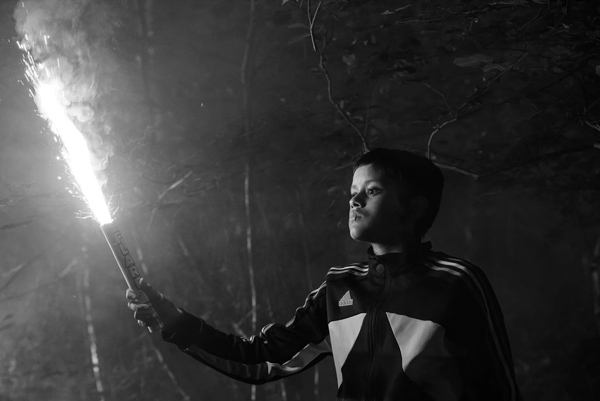Closely Watched Strain: Perretta Reflects Traumatic Coming-of-Age
There’s a bleak fatalism apparent in Ish, the directorial debut of visual artist Imran Perretta, named for its eponymous protagonist but also metaphorically signaling sidelined existence, seeing as it doubles as an adjective which connotes approximation to something (and notably in signifying a relation to an ethnic group). Familiar, in as much as not only is it a coming-of-age film but also in its depiction of a normalized occurrence in an authoritarian minded state, Perretta’s choice to utilize black and white suggests a disruption of such a binary in a world where nothing is quite clearly delineated. And whereas black and white also suggests the comfort of distancing the present from an uncivilized past, Peretta collapses the safety of such mechanisms for those subjected to the realities of virulent xenophobia which may have evolved but never abated.
Ish (Farhan Hasnat) and his best friend Maram (Yahya Kitana) are blissfully ignorant of the world outside of their close friendship, despite tragedy defining the world around them in contemporary London. Ish (short for Ishmael) lives with his father, elder sister, and grandmother, all who still mourn the death of his mother. In the background, constant news stories about Israel and Hamas paints a more drastic picture of a world in significant distress. Ish is younger and more naive than Maram, who is Palestinian, a detail often commented upon by Ish’s family. It’s clear Maram’s friendship is central to Ish’s current conception of himself, which is why the sudden appearance of a group of older boys who are also friends with Maram seems threatening. On an otherwise pleasant day Ish and Maram are racially profiled during a stop-and-search. As Maram is apprehended, Ish runs away and hides, an action which will change their friendship forever.

Perretta spells out the underlying sentiments quite clearly through Maram, who advises Ish, “Decide who you are or other people are going to decide for you.” The initially innocuous statement ends up being prophetic, of course, when circumstances change their relationship in the blink of an eye. It doesn’t matter so much what exactly happens to Maram when law enforcement pulls him into a van, but rather how he’s forsaken by Ish, whose fear and self-preservation instinct overrides their solidarity. The event catalyzes their parallel descent into criminality, symbolically waging their rebellion first within the confines of their own community as they rob shop owner Mr. Ahmed (Sagar Arya) of his fireworks.
Most of the drastic resonance is internalized and Ish never has the opportunity to express or process what has happened. During the opening moments of the film, Perretta positions the boys at the mouth of an ominous, abandoned tunnel, signifying their eventual journey through a right of passage, irrevocably changed when the innocence of childhood is roughly and suddenly tossed aside. It’s similar to a visualization utilized during the film’s final moments, with both boys resigned to their fates, the dissolution of their friendship redirecting them down different roads.
The narrative is a return to the sparse and spare tactics co-scribe Enda Walsh utilized in Hunger (2008), as opposed to his more recent meatier adaptations of Claire Keegan’s Small Things Like These (2024) or Ariana Harwicz’s Die My Love (2025). These are children who aren’t able to yet articulate what’s happened to them, but are marked by the awareness of how the world views them, not realizing how sticking together would allow them to see through the gross distortions of a cruel world.
Reviewed on August 30th at the 2025 Venice Film Festival (82nd edition) – International Critics’ Week. 89 Mins.
★★★/☆☆☆☆☆


